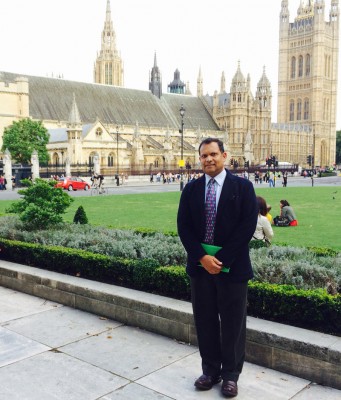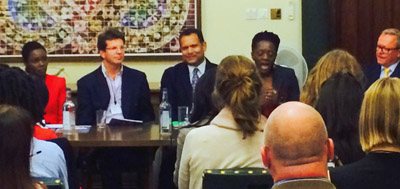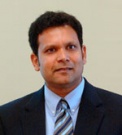After walking around in Parliament Square and mingling with the larger-than-life cast iron statues of Winston Churchill and Nelson Mandela, my wife, Anuja and I entered the Palace of Westminster from the Cromwell Green. We were, finally, inside the closely guarded compound of the United Kingdom’s Houses of Parliament.
The date was September 2, 2014 and the Big Ben struck its chimes precisely at 5:30 p.m.

Dr. Arvind Singhal was invited to travel from El Paso to London to participate in a parliamentary panel on global public health policy Sept. 2, 2014.
Some 45 minutes later, Lord Collins of Highbury introduced me as “Dr. Arvind Singhal, a leading global academic of communication and social change, based at the Department of Communication, The University of Texas at El Paso”
A wave of UTEP Miner pride ran down my spine.
What was I doing inside the highly ornate complex of towers, turrets, and spires that is home to the British House of Commons and the House of Lords?
Sitting in the packed CMA room which adjoined the 100 yard long Westminster Hall — where Winston Churchill lay in state for 23 days, and from where Nelson Mandela and President Barack Obama addressed the two Houses of Parliament, I was participating in a parliamentary panel on global public health policy.

Dr. Singhal, center, with Lord Collins of Highbury, far right.
Hosted by Member of Parliament Pamela Nash, and chaired by Lord Collins, the event commemorated the release of a report on the role of role of communication in globally mitigating the HIV/AIDS crises, especially the reduction of stigma.I was one of the 20-odd global communication and public health experts who had helped shape the document. A few of us participated in its release to the media, policy-makers, and officials of public health agencies and non-profits, including Comic Relief and The Elton John AIDS Foundation.
Why was I invited to this event? Perhaps on account of my quarterly visits to London, since 2010, to take part in the deliberations of the Global Polio Eradication Initiative as one of the eight members of its Independent Monitoring Board? That may have provided some credibility in public health circles.
More influential in this invitation was research I had carried out over a decade ago on the role of communication strategies in mitigating the HIV/AIDS epidemic. This research had led to the publication of a book, “Combating AIDS: Communication Strategies in Action,” which in 2004 was recognized with the Distinguished Book Award in Applied Communication by the National Communication Association, the largest professional association of communication scholars, professors, and practitioner. This body of work was recognized and referred to during this parliamentary event.
The event ended with a nice reception on the Thames side of Westminster Hall.
As we mingled, my wife Anuja wondered out-loud if her great-great-grandfather, Pandit Madan Mohan Malaviya, may have once graced this vast Parliamentary complex when he accompanied Mahatma Gandhi to the Second Round Table Conference in London in 1931 to negotiate India’s freedom. He most certainly did.
And, I wondered if other UTEP Miners had walked the corridors of these perpendicularly Gothic structures.
Dr. Arvind Singhal is is Samuel Shirley and Edna Holt Marston Endowed Professor in UTEP’s Department of Communication.

